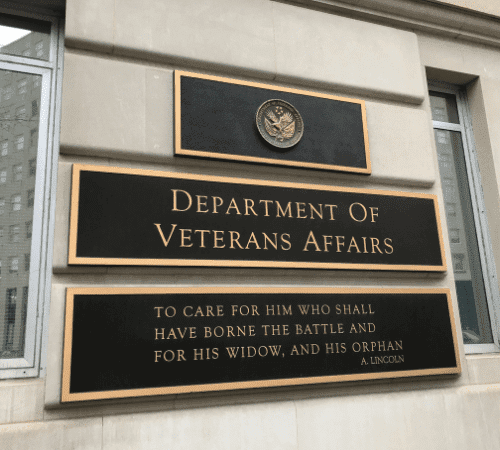Get comfortable with key VA acronyms and terms to better understand the disability claims process.
Summary
- The VA abbreviates frequently-used and cumbersome terms with acronyms.
- Veterans can gain a better understanding of how the disability claims process works and what their compensation options are by reviewing VA acronyms.
- Veterans disability benefits denial lawyers can offer insight into how these VA terms factor into an appeal.
Dealing with the Department of Veterans Affairs can prove complicated. Understanding the terms, acronyms, and abbreviations used by the VA can make it easier for you to comprehend what they’re saying about your claim.
However, that does not mean that you must – or should- seek disability compensation on your own. Instead, find the best possible resolution to your VA appeal with the guidance of a VA-accredited lawyer.
As seasoned veterans disability claims attorneys, we are not only familiar with these terms, but we also understand their role in the context of VA claims. Our team at VetLaw can add significant value to your case and help you obtain the VA disability benefits you need.
You can reach us at (855) 573-1503 or submit a contact form to schedule a free consultation. We’ll gladly provide a more detailed explanation of the VA acronyms involved in your claim and address any questions you may have for us.
A Guide to VA Acronyms and Terms Found in the VA Disability Claims Process
The VA has its own vocabulary when it comes to disability claims and appeals. Even if you served in the military for many years, there is still a good chance that you don’t know all of the terms the VA uses to describe various benefits, legislation, statuses, institutions, documents, and service-connected disabilities.
Are you familiar with these key VA acronyms and how they’re usually used?
1151/FTCA
The VA Medical Malpractice/Negligence/Federal Tort Claims Act offers the ability to file a claim against the government when one of its members, including an employee of the VA, behaves negligently and you suffer damages as a result.
A&A
Aid and Attendance: these are funds added to your VA claim that allow you to pay for assistance with daily activities.
Agent Orange
A toxic weed killer sprayed during the Vietnam War linked to numerous service-connected disabilities in U.S. veterans.
AMA
The Appeals Modernization Act governs how decisions issued on or after February 19, 2019 are appealed.
AWOL
Absent Without Leave
Branches of the Military
Branches include:
- Army
- Navy
- Air Force
- Marine Corps
- Coast Guard
BVA/”The Board”
The Board of Veterans Appeals governs VA appeals and helps overturn past decisions made by the VA.
CAVC
United States Court of Appeals for Veterans Claims
C&P
The Compensation and Pension Exam is the exam at which your disabilities are evaluated to determine the compensation you deserve.
C-File
The VA Claims File or your VA records.
Compensation
The award given for your loss, including injury and suffering.
CUE
Clear and Unmistakable Error
DAV
Disabled American Veterans
DBQ
The Disability Benefits Questionnaire, which you may need to fill out in order to determine the compensation you deserve.
DC
Diagnostic Code: the code used to label your specific diagnosis, which may determine the compensation and assistance you can expect.
DD-214/DD214
These are the forms used for your formal discharge.
DEA
Dependent Education Assistance, or funds set aside to help with the education of fully disabled veterans.
DIC
Dependency and Indemnity Compensation for dependents and widows: compensation paid out to the surviving dependents of a service member who died in the line of duty.
DL
Decision Letter, or the letter that explains the decision made about your claim.
DM/DM2
Diabetes Mellitus/Diabetes Mellitus Type 2, usually used to identify a disease acquired as a result of service or a condition for which you need treatment.
DMC
Debt Management Center, or the place veterans and their dependents can go for debt assistance.
DOD/DoD
The Department of Defense, or the larger governing military body.
DRO
Decision Review Officer, an officer assigned to review specific decisions related to your care.
ETS
Expiration–Term of Service/Discharge Date. This is the point at which your term of service has expired and you are eligible to separate from the military or choose to sign a new contract.
FOIA
Freedom of Information Act
GAD
Generalized Anxiety Disorder, a condition frequently suffered by combat veterans.
GSW
Gunshot Wound
GWS
Gulf War Syndrome, a chronic, multi-symptom condition that often impacts veterans who served during the Gulf War.
HLR
Higher-level review, when a Senior Adjudicator reviews a decision.
Housebound
Specific compensation awarded to bedridden veterans or those who require special assistance.
HTN
Hypertension or high blood pressure
IED
Improvised explosive device, or bomb.
IME/IMO
An independent medical exam or independent medical opinion, which you may ask for if you do not agree with the decision made by VA doctors.
INACDUTRA
Inactive Duty for Training, usually used for Reserves and National Guard.
JMR
Joint Motion for Remand, or a settlement agreement filed with the CAVC (United States Court of Appeals for Veterans Claims).
JSRRC
Joint Service Record Research Center
Legacy
For all rating decisions issued prior to 2/19/2019, veterans remain in the “legacy” appeals process, or the appeals process created before the AMA.
LHI
The LHI is one of the 3 VA contractors used to hold C&P exams.
LOD
Line of Duty
MDD
Major Depressive Disorder, a mental disorder often suffered by veterans.
MOS
Military Occupational Specialty, or your job in the military.
MST
Military Sexual Trauma
MUCMI
Medically Unexplained Chronic Multisymptom Illness. Some service members suffer from these disorders as a result of exposure to previously unidentified contaminants.
NOA
Notice of Appeal, usually used for CAVC appeals.
NOD
Notice of Disagreement: a Legacy appeal form in response to a Rating Decision.
Notice of Disagreement/10182
Appeal to BVA
OGC
Office of General Counsel
OIG
Office of Inspector General of VA
OSA
Obstructive Sleep Apnea
OSTRSD
Other specified trauma and stressor-related disorder: often a mental disorder that is not covered by other common acronyms and abbreviations.
OTH
Other Than Honorable, usually used in discharge paperwork.
PACT Act
A 2022 bill that addressed the need for increased healthcare and disability benefits for veterans exposed to toxins during their military service.
P&T
Permanent and total: a rating often assigned to a veteran that has a 100-percent combined disability evaluation that is permanent in nature (i.e. no new C&P exams will be scheduled by VA).
Pension
The monthly payment to wartime veterans that meet specific age and income requirements.
PMC
Pension Management Center
POA
Power of Attorney, or the legal power granted to make decisions on behalf of another individual.
POW
Prisoner of War
Preexisting
A medical condition that the veteran had prior to entering the military that was aggravated or activated by their service.
Presumptive
Often, presumptive information or conditions assume certain factors or inputs in the absence of other information.
PTSD
Post-Traumatic Stress Disorder, a condition frequently experienced by combat veterans or those in highly stressful roles.
QTC
One of three VA contractors used for C&P exams.
RAD
Release from Active Duty, also known as your discharge date.
RAMP
A period of time during which veterans could choose to voluntarily opt in to the new AMA framework.
RD
Rating Decision
Remand
A decision is remanded when it gets sent back to a lower level for review or reconsideration, usually as a result of changing information.
RO/VARO
The Regional Office
ROTC
Reserve Officers Training Corps
SC or S/C
Service-Connected/Service Connection
SMC
Special Monthly Compensation, usually awarded as a result of specific types of disabilities or needs.
SOC
Statement of the Case
SSA/SSD/SSDI
Social Security Administration/Social Security Disability
SSN
Your Social Security Number
SSOC
Supplemental Statement of the Case, or supplemental information added to the framework of your case.
STR/SMR
Service Treatment Record/Service Medical Record, or the past record of treatments received during your service.
TBI
TDIU/IU
Total disability based on your inability to be employed.
The Guard
Army National Guard
The Reserves
Soldiers who combine a military role with a civilian career.
USC/USCA
The United States Code or United States Code Annotated, also known as the law.
VA
Department of Veterans Affairs
VA9/Form 9
This is the legacy appeal form to the BVA, which is in the process of phasing out.
VA Coach
An un-accredited, and typically underqualified, individual who claims they can help veterans secure massive payments in return for a significant fee.
VBMS
Veterans Benefit Management System, which stores C-Files.
VES
One of three VA contractors that holds C&P exams.
VFW
Veterans of Foreign Wars
VLJ
Veterans Law Judge
VSM
The Vietnam Service Medal
VSO
The Veteran Service Organization, which provides a variety of services and support to veterans.
Learn How These VA Acronyms and Terms Apply to Your VA Claim Denial
Are you struggling to understand the paperwork related to your VA disability claim? A quick look at these VA acronyms can help define them and give you a better idea of what they mean, where you might see them, and what they might mean for your claim.
In addition to a host of acronyms, there is also a set of VA benefits terminology that veterans should explore to better understand the claims process. At VetLaw, we can provide the background and context you need to make decisions about your VA disability claim.
Our team of VA-accredited veteran disability benefits lawyers believe that our clients deserve a clear and honest assessment of their case, and that is precisely what we have provided to veterans across the country over the past decade. Veterans place their trust in us because they know that we operate with integrity and deliver outstanding results.
Ask VetLaw’s VA Disability Appeals Attorneys About Confusing Acronyms in Your Claim
Stumbling through unfamiliar or complicated technical vocabulary is a common experience for many veterans who receive benefit denials from the VA. Unfortunately, getting denied by the VA is also a common experience.
At VetLaw, we have steadfastly advocated for veterans seeking disability compensation for their service-connected injuries and illnesses, helping them overcome unjust VA denials.
If you are interested in learning how we can support you through the appeals process, get in touch with our team. We encourage you to reach out to us at (855) 573-1503 or submit a contact form to schedule a free consultation.
Don’t let complex VA jargon stop you from pursuing the disability compensation you are rightfully entitled to. Instead, bring in one of our experts to walk you through each step.







